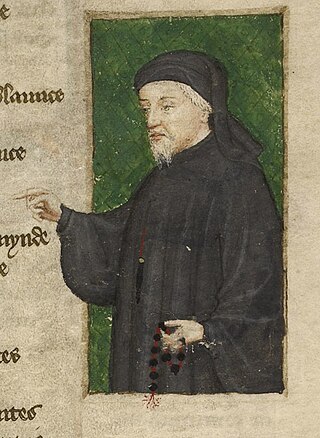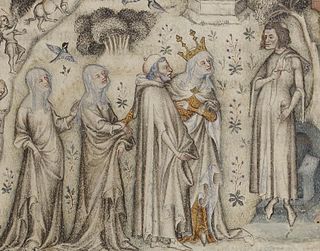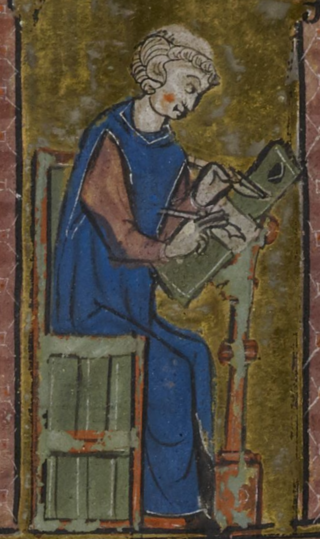
Geoffrey Chaucer was an English poet, author, and civil servant best known for The Canterbury Tales. He has been called the "father of English literature", or, alternatively, the "father of English poetry". He was the first writer to be buried in what has since come to be called Poets' Corner, in Westminster Abbey. Chaucer also gained fame as a philosopher and astronomer, composing the scientific A Treatise on the Astrolabe for his 10-year-old son, Lewis. He maintained a career in the civil service as a bureaucrat, courtier, diplomat, and member of parliament.

Grenoble is the prefecture and largest city of the Isère department in the Auvergne-Rhône-Alpes region of southeastern France. It was the capital of the Dauphiné historical province and lies where the river Drac flows into the Isère at the foot of the French Alps.

John Gower was an English poet, a contemporary of William Langland and the Pearl Poet, and a personal friend of Geoffrey Chaucer. He is remembered primarily for three major works—the Mirour de l'Omme, Vox Clamantis, and Confessio Amantis—three long poems written in French, Latin, and English respectively, which are united by common moral and political themes.

Guillaume de Machaut was a French composer and poet who was the central figure of the ars nova style in late medieval music. His dominance of the genre is such that modern musicologists use his death to separate the ars nova from the subsequent ars subtilior movement. Regarded as the most significant French composer and poet of the 14th century, he is often seen as the century's leading European composer.

Medieval literature is a broad subject, encompassing essentially all written works available in Europe and beyond during the Middle Ages. The literature of this time was composed of religious writings as well as secular works. Like modern literature, it is a broad field of study, from the utterly sacred to the exuberantly profane, touching all points in between. Works of literature are often grouped by place of origin, language, and genre.

The chanson de geste is a medieval narrative, a type of epic poem that appears at the dawn of French literature. The earliest known poems of this genre date from the late 11th and early 12th centuries, shortly before the emergence of the lyric poetry of the troubadours and trouvères, and the earliest verse romances. They reached their highest point of acceptance in the period 1150–1250.
According to the medieval poet Jean Bodel, the Matter of Rome is the literary cycle of Greek and Roman mythology, together with episodes from the history of classical antiquity, focusing on military heroes like Alexander the Great and Julius Caesar. Bodel's division of literary cycles also included the Matter of France and the Matter of Britain. The Matter of Rome includes the Matter of Troy, consisting of romances and other texts based on the Trojan War and its legacy, including the adventures of Aeneas.

Gilles Vigneault is a Canadian poet, publisher, singer-songwriter, and Quebec nationalist and sovereigntist. Two of his songs are considered by many to be Quebec's unofficial anthems: "Mon pays" and "Gens du pays", and his line Mon pays ce n'est pas un pays, c'est l'hiver became a proverb in Quebec. Vigneault is a Grand Officer of the National Order of Quebec, Knight of the Legion of Honour, and Officer of the Ordre des Arts et des Lettres.

Adam de la Halle was a French poet-composer trouvère. Among the few medieval composers to write both monophonic and polyphonic music, in this respect he has been considered both a conservative and progressive composer, resulting in a complex legacy: he cultivated admired representatives of older trouvère genres, but also experimented with newer dramatic works. Adam represented the final generation of the trouvère tradition and "has long been regarded as one of the most important musical and literary figures of thirteenth-century Europe".
The imaginary is the set of values, institutions, laws, and symbols through which people imagine their social whole. It is common to the members of a particular social group and the corresponding society. The concept of the imaginary has attracted attention in anthropology, sociology, psychoanalysis, philosophy, and media studies.
Paul Zumthor, was a medievalist, literary historian, and linguist. He was a Swiss from Geneva.
Decasyllable is a poetic meter of ten syllables used in poetic traditions of syllabic verse. In languages with a stress accent, it is the equivalent of pentameter with iambs or trochees.
Geoffrey of Vinsauf is a representative of the early medieval grammarian movement, termed preceptive grammar for its interest in teaching the ars poetica.

The Université Grenoble Alpes is a public research university and a grand établissement in Grenoble, France. Founded in 1339, it is the third largest university in France with about 60,000 students and over 3,000 researchers.
Contemptus mundi, the "contempt of the world" and worldly concerns, is a theme in the intellectual life of both Classical Antiquity and of Christianity, both in its mystical vein and its ambivalence towards secular life, that figures largely in the Western world's history of ideas. In inculcating a turn of mind that would lead to a state of serenity untrammeled by distracting material appetites and feverish emotional connections, which the Greek philosophers called ataraxia, it drew upon the assumptions of Stoicism and a neoplatonism that was distrustful of deceptive and spurious appearances. In the familiar rhetorical polarity in Hellenic philosophy between the active and the contemplative life, which Christians, who expressly rejected "the World, the Flesh, and the Devil", might exemplify as the way of Martha and the way of Mary, contemptus mundi assumed that only the contemplative life was of lasting value and the world an empty shell, a vanity.

Jean Wauquelin, born in Picardy, was a writer and translator in French, active in the County of Hainaut in the Burgundian Netherlands, a county now located in Belgium near the border with France. Wauquelin died on 7 September 1452 in Mons, Hainaut. His date of birth remains unknown.
Richard Johann Utz is a German-born medievalist who has spent much of his career in North America. He specializes in medieval studies, and served as president of the International Society for the Study of Medievalism (2009–2020).
P. des Molins, probably Pierre des Molins, was a French composer-poet in the ars nova style of late medieval music. His two surviving compositions – the ballade De ce que fol pensé and rondeau Amis, tout dous vis – were tremendously popular as they are among the most transmitted pieces of fourteenth-century music. The ballade is found in 12 medieval manuscript sources and featured in a c. 1420 tapestry; the rondeau is found in 8 sources and referenced by the Italian poet Simone de' Prodenzani. Along with Grimace, Jehan Vaillant and F. Andrieu, Molins was one of the post-Guillaume de Machaut generation whose music shows few distinctly ars subtilior features, leading scholars to recognize Molins's work as closer to the ars nova style of Machaut.
Mireille Issa is a Lebanese medievalist born in Beirut. She studies the Late Latin period of Antiquity.
The Udice Group is a self-selected association of thirteen public research universities and their seventeen Grandes Écoles in France. The group is headquartered in Paris and was established in 2020. It is the partial successor to the CURIF Group created in 2008 and dissolved in 2020. It is chaired by Michel Deneken, president of the University of Strasbourg.










